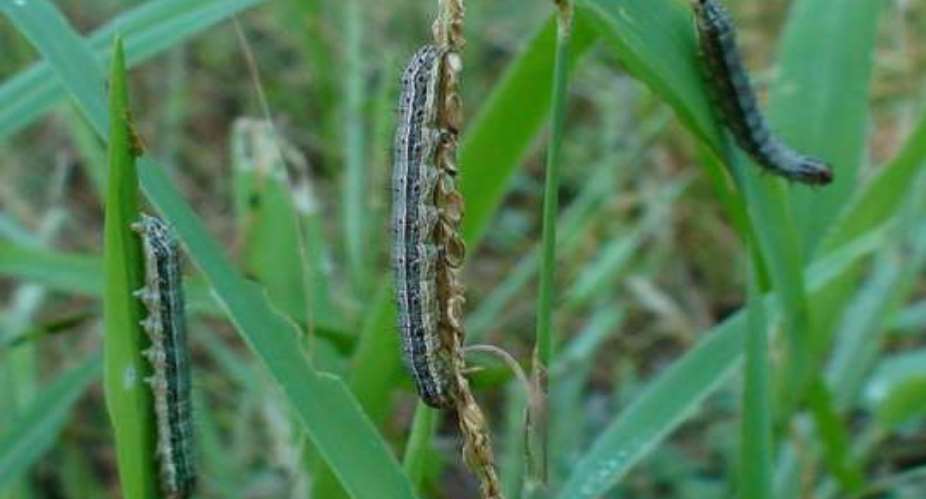By Samuel Akapule
Bolgatanga, June 20, GNA - The Fall Army Worms have invaded some farms in the Upper East Region.
The stakeholders raised the concern at a Regional forum organised in Bolgatanga by the Northern Ghana Governance Activity (NGGA) to collate views to influence National Agricultural Budget for 2018.
The stakeholders made up of civil society organisations including the Regional Women in Agriculture Platform and Widows and the Orphan Movement, demanded to know the measures put in place by the Ministry of Food and Agricultural (MOFA) to address the plight of the farmers.
They expressed fear of a possibility of the Region facing low productivity if MOFA did not act swiftly to solve the problem.
Mr Timothy Zagina of MOFA who reacted to the concerns of the stakeholders on behalf the Regional Director of MOFA, Reverend John Manu, confirmed that the Districts so far affected included Garu, Kassena-Nankana West, Binduri and Bawku.
He said MOFA had released adequate chemicals to the affected districts and those that had not yet experienced the havoc in addition to field staff to help tackle the menace.
The stakeholders complained about inadequate staff in the 13 Municipal and Districts in the region, whilst the agricultural information gaps that existed among the small holder farmers and MOFA was affecting production.
Mr Eugene Yirbuor, the Programme Management Specialist of USAID in charge of the Tamale Sub Office, who promised to liaise with the local radio stations in the region for MOFA to educate the farmers, urged the Regional Directorate to carry out the education in the various local languages.
Contributing to their inputs into the 2018 impending National Agricultural Budget, the stakeholders called for efficient research and adequate scientific methods to be put in place to address future occurrence of crop infestation by the worms and other pests.
Other inputs made by them included, the training of many Agricultural Extension Agents, provision of irrigation facilities, storage facilities, bullock traction, revamping of the Pwalugu Tomato and the Zuarungu Meat factories, fast-tracking the release of farm inputs such as improved seeds, fertilizers and tractor services and linking smallholder farmers to market access, warehouses.
They said their concerns and needs had to be addressed so as to pave the way for the successful implementation of the planting for food and jobs, the One Village one Dam and the One District and One Factory policies.
Mr Chrys Pul, the Governance and Advocacy Specialist of the NGGA, explained that one of the main objectives of the five-year NGGA was to set up a vibrant advocacy agenda both at the District, Regional and National levels to advocate to help improve upon food security.
It is to ensure more responsive governance to improve agricultural development, particularly in the northern parts of the country, enhance women's active participation in local governance as well as increase community dialogue and consensus building.
The NGGA is being funded by the USAID and implemented by a consortium led by Care International Ghana including Action Aid Ghana, SEND-Ghana and the West Africa Network for peace-building implemented in 26 districts in the three northern regions.
GNA





 2024 elections: A vote for Mahama will turn Ghana's education system upside down...
2024 elections: A vote for Mahama will turn Ghana's education system upside down...
 Dumsor: NPP will be punished in election 2024 if gov't doesn't address current s...
Dumsor: NPP will be punished in election 2024 if gov't doesn't address current s...
 There is a clear need for the downstream petroleum audit services provided by SM...
There is a clear need for the downstream petroleum audit services provided by SM...
 Akufo-Addo directs GRA, Finance Ministry to renegotiate deal with SML
Akufo-Addo directs GRA, Finance Ministry to renegotiate deal with SML
 Kofi Bentil’s love, support for Bawumia will never represent IMANI – Franklin Cu...
Kofi Bentil’s love, support for Bawumia will never represent IMANI – Franklin Cu...
 NPP outperforms NDC in health infrastructure in Ashanti Region — LIPS report
NPP outperforms NDC in health infrastructure in Ashanti Region — LIPS report
 Critics fear Togo reforms leave little room for change in election
Critics fear Togo reforms leave little room for change in election
 Current power outages purely due to mismanagement – Minority
Current power outages purely due to mismanagement – Minority
 ECG hoists red flag to fight Ashanti Regional Minister over arrest of General Ma...
ECG hoists red flag to fight Ashanti Regional Minister over arrest of General Ma...
 Mahama’s 24hr economy will help stabilise the cedi; it’s the best sellable polic...
Mahama’s 24hr economy will help stabilise the cedi; it’s the best sellable polic...
